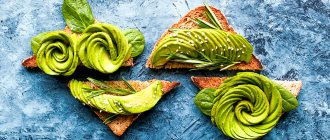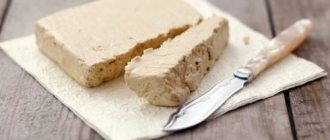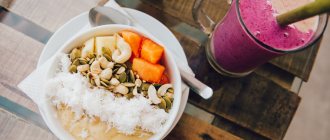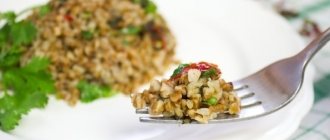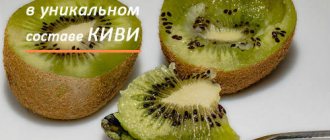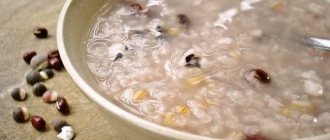Common fennel
Common fennel (dill, Voloshsky dill, sweet dill, copra) is a powerful perennial, sometimes one-biennial, spicy herbaceous plant up to 2 m high from the celery family.
Fennel leaves contain a large set of vitamins, nicotinic and folic acids. Fennel contains a lot of salts of iron, potassium, calcium, and phosphorus.
The medicinal and culinary properties of this spicy plant have been known since the times of Hippocrates and Avicenna.
Fennel is especially widely used in the cuisine of the peoples of Indochina, and in Europe - in French and Italian. The plant has a pleasant, anise-like, slightly sweet-spicy aroma and a refreshing taste.
Use in cooking
The fruits and essential oil of fennel are used in cooking as a spicy seasoning for food.
Fennel greens have a very pleasant, slightly sweet, refreshing taste. It is consumed raw as a dessert, added to salad, stewed with butter and seasoning made from flour and broth.
In the Caucasus, the leaves are also used as a spice in the preparation of national dishes. Succulent leaves and young umbrellas are preserved.
The stems and young umbrellas are used for pickling vegetables, and the fruits are used in baking.
Greens go especially well with sweet, sweet and sour and fruit salads.
The stems and seeds are used for pickling cucumbers and tomatoes and sauerkraut.
Sauces made from fennel are served with pork, offal dishes and cold fish.
Umbrellas of flowering fennel are used to flavor cabbage, cucumbers, zucchini, tomatoes and peppers when pickling and canning. It is also used for pickling apples, watermelons, melons, and wild berries.
The seeds are included in spicy curry mixtures and in European fish mixtures. They are used in the preparation of aromatic “bouquets” for flavoring products.
Meat and fish dishes are sprinkled with spice before hot processing: 2-4 g per 1 kg of product. In marinades, pickles, and sauces, the seeds are used in the following proportion: 1-2 g per 1 liter of water.
FENNEL VEGETABLE
Vegetable fennel is an excellent dietary and delicacy product with a subtle, unique anise smell and a sweetish taste. It should be consumed more often by people who have problems caused by poor digestion, chronic coronary insufficiency and hypertension. It can be used fresh or boiled in various salads, as well as as an independent dish. Stewed or baked fennel serves as a delicious side dish for meat or fish. Given its own sweet taste, fennel works well with lemon juice, black pepper and olive oil.
Vegetable fennel is on sale almost all year round, but it is especially useful for our body in winter. The best are considered to be white heads with small light green leaves. Covered tightly with cling film or wrapped in a damp cloth, they can be stored in the refrigerator for a week. Before use, the roots and feathery leaves with petioles are cut off, the outer layer of leaves is removed, or the thin skin is removed. They are cut only lengthwise, usually into four parts, and if desired, cut out the green core.
Recently, mini-fennel has appeared on sale; its fresh heads are used as a side dish whole or cut lengthwise into two parts.
Fennel seasoning consists of the seeds of the plant of the same name.
, which are located in its inflorescences. They have a sweetish-spicy taste and a pleasant smell, combining the aroma of dill and anise. It is characterized by its small size, oblong shape and greenish-brown tint.
Scientists have found that the first mentions of fennel are found in the books of Ancient India. Even then, it was used as a seasoning for dishes, which not only improves their taste, but also protects against many diseases. In Ancient Greece and Ancient Rome, the plant was used after meals to freshen breath and improve digestion. In the Middle Ages, the spice became widespread in Europe and began to be grown in the field.
Benefits and chemical composition
- The seasoning contains a large number of antioxidants, which are an excellent tool for the prevention of cancer.
- Fennel has an anti-inflammatory effect and helps eliminate high cholesterol levels in the blood.
- The use of seasoning in the daily diet has a beneficial effect in the treatment of pneumonia, bronchitis and hepatitis.
- Fennel is an indispensable remedy in the quest to maintain eye vigilance, strengthen hair roots and improve memory.
- A pleasant property of the spice is its ability to accelerate metabolism and stabilize blood sugar levels, thereby reducing the desire to eat sweets and starchy foods. This is why the seasoning is so popular among those who want to lose weight.
- Experts have proven that the properties of fennel are also useful for the care of mature skin. The phytoestrogens contained in its composition are indispensable for eliminating wrinkles and skin pigmentation disorders.
- This spice can treat alcohol poisoning, as it neutralizes toxins and carcinogens in the blood.
The spice is rich in minerals, including calcium, magnesium, iron, zinc and chromium. They contain vitamins A, B and C, as well as a significant amount of essential oils.
Liver Health
Betaine contained in beet juice stimulates liver function and promotes its detoxification, removal of toxins from it, cleansing of the bile ducts, kidneys and bladder. In addition, beets will help prevent the accumulation of fatty deposits in the liver caused by alcohol abuse and protein deficiency.
The carotenoids contained in beets will significantly improve the appearance of your hair, making it shiny and stronger. In addition, by improving blood circulation and nourishing the hair follicles, beets will help get rid of dandruff.
Harm and contraindications
There is a risk when consuming fennel in cases of intolerance to this product by the body. It is also contraindicated for pregnant women, as it can cause unwanted cramps (read more about the beneficial properties of fennel and contraindications for women in general). It is not recommended to combine fennel with other diuretics, as they enhance the effect, which has a negative impact on a person’s well-being.
Components of fennel essential oils are dangerous in overdose
: They cause breathing problems, rapid heartbeat and bleeding. Therefore, it is important to use the seasoning in moderation (?).
The beneficial properties and contraindications of fennel have been written in detail.
Harm of beets to the human body
To find out why beets are harmful, you must first understand what chemical processes occur in the body after consuming it:
- When the root vegetable is ingested, an acid reaction begins in the stomach. This can provoke an exacerbation of gastritis and other gastrointestinal diseases.
- Thanks to the oxalic acid contained in the vegetable, beets are often included in folk recipes for the treatment of urolithiasis. In fact, if stones are present, eating root vegetables can only worsen the patient’s condition.
- Calcium absorption is noticeably reduced. Therefore, the risk of developing osteoporosis, fractures, destruction of tooth enamel and other pathologies caused by a lack of mineral increases. During pregnancy, difficulties may arise with the formation of the baby's bone tissue.
- Due to the high sugar content, the vegetable is undesirable for diabetic patients. In any case, you need to be careful when adding beets to your diet.
- Considering the laxative effect of the root vegetable, there is a high probability of its harmful effects on the body with a tendency to stomach upsets.
All of the possible negative effects listed apply equally to both raw and cooked beets. In any form, it affects the body almost equally. It should be understood that when consumed in moderation, the vegetable is unlikely to cause harm to health. However, if any pathologies are present, caution should be exercised.
The greatest harm beets have for the human body is its ability to absorb everything, including harmful substances. Therefore, it is best to use vegetables from your own garden. If this is not possible, the root vegetable needs to be boiled. Most of the harmful substances go into the water. When preparing first courses, the vegetable must first be blanched in boiling water for 1-2 minutes. It is not recommended to drink fresh beet juice, especially undiluted. It must be left in a cool place for at least 2-3 hours, only then consumed.
Consumption in food
The fennel spice has a sweet and spicy taste, but with a slight hint of bitterness. It is popular in Mediterranean, Arabic, Indian and Chinese cuisines. Fennel is also popular among confectioners. Crushed seeds are usually added to dough, and whole ones are used to decorate buns and cookies.
Often used in meat and fish dishes, less often in soups and salads. The seasoning is most popular when cooking pork, carp and pike.
. To release the aroma of the seasoning, you can heat it in a frying pan or lightly rub it with your fingers. It is worth remembering that the seeds are used in a ratio of 3-4 g of spice per 1 kg of meat.
How to prepare?
The seeds are collected after they ripen, when they turn light brown. This stage lasts two months – August and September. The ripening process is uneven, so harvesting occurs repeatedly.
To dry fennel seeds, you need to
:
- Cut off the inflorescences (the so-called umbrellas).
- Place them in a dry, dark place (for 2-3 days).
- Rub the dried inflorescences between your palms over newspaper to separate the seeds from the stem.
- Remove the husks from the seeds.
- Place fennel seeds into a jar with a tight lid.
How to choose and where to buy?
When purchasing seasonings in the form of seeds, you should pay attention to their appearance. They should be light brown in color, dense in structure, with pronounced veins.
You can buy dried seasoning at any supermarket.
, as well as in food markets. The price for 100 grams of spice was set in the range from 80 to 120 rubles in Moscow and from 70 to 100 rubles in St. Petersburg.
Thus, fennel can be confidently called indispensable in the kitchen of any housewife. It adds an exquisite taste to dishes and has a wide range of beneficial properties for the body. It is necessary for people of any age; everyone will find in it a remedy for many ailments.
If you find an error, please select a piece of text and press Ctrl+Enter
.
Not many people know about the health benefits of fennel. More often we are familiar with this plant as a herb that helps relieve colic in infants. But this is not the only beneficial properties of fennel. It helps with anemia, flatulence, constipation, diarrhea, and respiratory diseases. They drink it for menstrual irregularities and to freshen the mouth. In addition, fennel is widely used in the cuisine of many nations.
This vegetable has been the subject of discussion for a long time. True, not every consumer saw it with his own eyes. That is why there was a need to talk in more detail about fennel, as not only a foreign, but also a very healthy food product.
Benefits of beets - noteworthy list
What are the benefits of beets?
, is explained by the presence in root vegetables of various vitamins (group B, PP, etc.), betaine, minerals (iodine, magnesium, potassium, calcium, iron, etc.), bioflavonoids. Beets are beneficial as a good source of vitamin C, copper and phosphorus. Beet leaves contain a lot of vitamin A, and the roots contain vitamin C. Beetroot is indispensable:
- for healthy bones, arteries and skin, as it contains quartz;
- to eliminate toxins from the body;
- to prevent the appearance or growth of malignant tumors.
- for people suffering from fluid retention in the body, and for people who suffer from obesity;
- for the production of hemoglobin, prevention of anemia, leukemia;
- for hematopoiesis - beets cope with this thanks to the high content of iron and copper in the roots;
- to cleanse the kidneys, blood, reduces the acidity of our body, and helps cleanse the liver;
- to find the right solutions, as it stimulates our brain and eliminates toxins that can accumulate in our body, maintaining good psychological health;
- for blood vessels and the heart - beets have a vasodilating, anti-sclerotic and calming effect, and are necessary for the normal functioning of the heart;
- for the prevention and treatment of hypertension, atherosclerosis and other diseases of the cardiovascular system;
- to protect against the effects of radioactive and heavy metals, since beets contain a lot of pectin substances, thanks to which the vegetable helps eliminate cholesterol and delays the development of harmful microorganisms in the intestines;
- to restore the body after exhaustion, loss of strength after illnesses, it is used as a general strengthening agent that improves digestion and metabolism;
- In addition, beets are indispensable for rejuvenating and preserving our beauty due to the presence of folic acid in beets, which promotes the creation of new cells.
However, it is worth keeping in mind one delicate property of this vegetable. Red beets are not very good for those who have a weak stomach or for those with high acidity, as they have a laxative and diuretic effect.
What is fennel? Spice or vegetable?
Almost everyone considers Italy to be the true homeland of fennel. After all, back in the days of the Roman Empire, it was actively used by aristocratic cooks to prepare a variety of dishes. And Pliny was the first to describe the medicinal qualities of the plant.
Later, historians found out that this vegetable crop had been known to mankind since ancient times and was used not only by the Romans, but also by the Egyptians, Indians, Greeks, and Chinese as a food spice and aromatic additive and a valuable medicine. Thus, fennel was grown with precision throughout Southern Europe, the Mediterranean and Asia Minor.
At the moment, the unpretentious plant can be found everywhere except the Arctic and Antarctica. The wild-growing variation is readily available here only in the Crimea and the Caucasus.
Today there are two main cultivated species of fennel:
- ordinary (it is also called pharmaceutical or hair dill);
- vegetable (or Italian).
In appearance, it resembles the usual dill, only taller and resistant to winds. Fennel leaves are just as thin and sharp, but the Italian variation is characterized by a thicker, fleshier and juicier stem. The plant blooms with golden yellow flowers. When they die, seed clusters are formed, which are collected when they harden.
Fennel seeds are small, oval in shape, greenish-brown in color and taste strongly reminiscent of anise liqueur.
In vegetable fennel, the main fruit is a tuber that resembles an onion.
Modern agricultural workers point to the possibility of growing healthy fennel in a pot in their kitchen. The main thing is that the sun's rays are available to it.
Borsch
There is one traditional Russian recipe that does not lose its popularity. It's ideal for keeping you warm during the cold season. Of course, this is borscht. We offer a vegetarian version:
- Fry finely chopped onion over low heat.
- Cut the beets into small pieces, add them to the onions and simmer them together.
- When they are tender, about 7 minutes, add the vegetable broth.
- Simmer over low heat for 15 minutes.
- Add finely shredded fresh cabbage, finely chopped parsley, sherry (or other wine), salt and pepper to taste.
- According to the traditional recipe, you can also add sour cream or Greek yogurt (unsweetened).
The plant has been known to mankind for at least 4 thousand years. For a long time, only the wild variety of the plant was used. At first, only leaves were used. Root vegetables were used as medicine; they became widespread only by the 4th century BC.
The ancient Persians treated the vegetable with caution. It was believed that he brings quarrels and disagreements. If someone wanted to cause discord in the family or ruin the life of an enemy, he would quietly throw beets into the house. The ancient Romans shared a wary attitude towards the root vegetable, but despite this, they enjoyed eating it and also used it as an aphrodisiac. The Greeks were closest to the truth. Already in those days they knew about the healing properties of beets and actively used their knowledge in practice.
At the beginning of our era, root beets began to be cultivated. There was a division into fodder and table varieties, and sugar beets were distinguished separately. The vegetable acquired its usual round shape only in the 16th century; before that it was more elongated and more like a carrot. Over several centuries, the culture spread to almost all continents (with the exception of Antarctica). In Assyrian texts there is a description of its cultivation in the Hanging Gardens of Babylon.
Currently, not only annual, but also biennial and even perennial types of beets are grown. Several dozen varieties have already been bred. Every national cuisine includes favorite beetroot dishes. For example, it’s hard to imagine Russian cuisine without herring under a fur coat, Ukrainian cuisine without borscht, Belarusian cuisine without botvinya. Moreover, all parts of the plant are used: the leaves are ideal for salads; soups, main courses, even drinks and desserts are prepared from the root vegetable. Beets have become an integral part of many traditional dishes.
Composition of fennel
Fennel belongs to the list of plants that are rich in various biologically active substances and do not contain cholesterol or sugar at all.
Thus, chemists can see in the plant composition:
- essential oils;
- aspartic acid;
- vitamins A, C, B;
- natural antioxidant arginine;
- flavonoids;
- quercentin;
- routine;
- different types of kaempferol;
- glycosides;
- amino acids such as cineole, anethole, histidine;
- phytoestrogens polymers;
- stimulating microelements such as molybdenum, cobalt, iron, magnesium, sodium.
See fennel tuber nutrition facts chart below.
Is it possible to eat raw beets every day? Why you should eat beets every day: nine reasons
In what form does this root vegetable help our body, and when does it harm, we’ll figure it out with an endocrinologist.
First, let's talk about beets in their raw form; after all, it is in this form that they are most useful.
- Raw beets, with low calorie content, have a large amount of fiber, dietary fiber and ballast substances. And this is an excellent prevention of constipation.
You can call this root vegetable number one for ideal intestinal function: when it enters the body, beets feed the native microflora with useful substances and help fight intestinal dysbiosis.
Beets have a positive effect on fat metabolism due to substances that reduce fatty infiltration of the liver, thereby helping us lose weight. But this is more of an additional product in a weight loss system than a basis.
Beets are rich in iron and magnesium. Nowadays, not everyone eats enough meat to get the amount of iron the body needs. And vegans don't eat meat at all. Therefore, with the help of beets, you can add iron to your body. Magnesium is a necessary element for the functioning of the nervous system, the prevention of atherosclerosis and hypertension.
Beets contain a lot of folic acid, which is indispensable for the normal functioning of our circulatory system. In addition, folic acid is necessary for pregnant women.
Raw beets contain a large amount of betaine, one of the strongest substances in the fight against cancer cells.
Beets, with their low calorie content, provide a large volume in the stomach, causing a feeling of fullness, thereby reducing appetite, we do not want to eat more.
It contains substances - precursors of antioxidants, which help dilate blood vessels and help normalize blood pressure.
Athletes find beetroot juice very useful after exercise to build good muscle mass.
Benefits of fennel
An overseas vegetable cannot stand “on the sidelines” when it comes to its beneficial qualities. Fennel seeds are mainly used for medicinal purposes. But grass also has its uses. Vegetable fennel bulbs are most often used in cooking.
Rich in phytoestrogens, fennel is often used to relieve colic, as a carminative, in the treatment of irritable bowels, and for certain diseases of the kidneys, liver and spleen.
Fennel is also used as an expectorant for lung diseases. Mothers are recommended to drink fennel tea to improve lactation. It suppresses appetite, improves digestion, relieves heartburn and has mild diuretic properties. Fennel has long been used for diseases such as amenorrhea, lack of menstruation, and helps normalize the menstrual cycle.
Preparations with fennel help with angina pectoris, lower blood pressure, improve mood and relieve anxiety and anxiety.
In addition, fennel can improve libido, increasing sex drive.
As an antispasmodic, fennel is used for gout, cramps, spasms, and colic. Fennel seed tea helps with snake bites, insect bites and poisoning. This is an excellent remedy for weight loss. By increasing urine production, it helps cleanse the body of toxins and waste.
For colds and sore throats, gargle with fennel decoction to reduce hoarseness and pain.
As you can see, the list of beneficial properties of fennel is long. To summarize all the benefits that fennel can provide, it is useful for:
Causes
The human body is so smart that it can tell itself what it is missing. If you really want a product, it is likely that it is the body that symbolizes the lack of some substances.
Diseases
If the body requires beets, this may be a sign that the liver wants to “rest.” To prevent this from happening, it is recommended to drink 100 grams of fresh beet juice in the morning for a week once a year, and another 200 grams of baked beet juice throughout the day.
What is missing in the body?
Why does the body need beets, what does it lack? This is a signal that there is a deficiency of quite rare vitamins and microelements:
- Vitamin U
is a very important vitamin, but it is worth noting that it is not produced by the cells of the body and comes only from food. The vitamin has many functions, but is mainly needed to recognize and eliminate foreign compounds. Rarely found in products. Beetroot is one of the main sources of this component. - Saponins
– fight tumors, have a beneficial effect on mental activity, and reduce the possibility of brain aging (read about the benefits of beet juice and how to take it correctly for cancer). - Chromium
is an important trace element that is necessary for proper lipid, protein and carbohydrate metabolism. Chromium deficiency affects glucose metabolism.
Other reasons
The desire to eat beets often indicates a need - beets improve metabolism and help remove toxins, waste and other unwanted compounds from the body. Many women know that beets also promote weight loss.
You may want beets not only because of a lack of something in the body. It is quite possible that the whole point is simply a matter of human taste preferences.
Use of fennel in cooking
This plant has been used in cooking for a long time. The fact is that the cook always has the opportunity to use all parts of fennel: seeds (whole or ground), bulb, stems, flowers and feathery leaves.
The greens and seeds of this plant are used as a spice. Many healthy and tasty dishes are prepared from fennel root.
For example, in Ancient Greece, fennel seeds were a symbol of success, and the Puritans called them meeting seeds precisely because they often chewed them during long negotiations.
In India, it is customary to serve the seeds rolled in sugar as an after-dinner dessert. Just fennel seeds also help freshen your breath.
Of course, the seeds are most often used in culinary recipes (for the production of liqueurs, bread, confectionery products, due to the presence of 12% fatty oil, replacing cocoa butter), but the remaining parts have also found their use.
For example, greens and onions are very popular in cooking fish dishes (especially carp), soups, sauces (most often curry and mayonnaise) and compotes.
As a specific spice, fennel adds a special aroma to sauerkraut, canned vegetables, cold appetizers, and salad marinades.
During the hot season, it is good to dilute fennel juice in water. This aromatic drink perfectly relieves thirst and does not always require refrigeration.
It is worth noting that Italian and French cuisine cannot do without sweet dill, considering fennel the most aromatic herb.
You can replace fennel with regular garden dill, but the aroma of fennel is sweeter and more delicate.
Which is healthier: raw or boiled beets?
Beets are one of the few products that practically do not lose their healing properties during heat treatment. On the contrary, due to the fact that when boiled, the root vegetable becomes softer and acquires a more pleasant taste, it can not only be used in a larger number of dishes, but also irritates the gastric mucosa less.
However, there are certain diseases for which it is better not to eat raw vegetables:
- gastritis;
- pancreatitis;
- gout.
Harm of fennel
Some spices such as cumin, coriander, and fennel may also cause an allergic reaction in some people. Therefore, people who are allergic to these herbs should not use it.
Those who take blocker medications, which are often prescribed for cardiovascular diseases, should not consume a lot of fennel. Fennel contains a lot of potassium and this can cause an increase in the level of this element in the blood.
High potassium levels are also dangerous if the kidneys are not functioning properly, as they will not be able to remove excess potassium from the body.
It is also worth limiting the consumption of fennel for those who have epilepsy during pregnancy, as there may be a risk of miscarriage.
In general, fennel is a healthy food product and, if possible, it should be included in your diet, at least in the form of a spice.
Table of nutritional value of fennel tuber per 100 grams of product
Watch the video to see what nutritionists say about the beneficial properties of fennel.
Fennel is an umbrella plant similar to dill, known since the time of Euclid. Fennel has always been valued as a spice because it tastes like anise and has subtle notes of mint and cumin.
Today, fennel is widely used in medicine, cooking, food production, agriculture (animal feed), and in the production of perfumes.
Beneficial properties of beets
Beetroot is a root vegetable, and it is the “roots” that are most often eaten. However, the stems and leaves of this vegetable (“tops”) are also useful and quite edible.
Beets contain a significant amount of B vitamins and plant fiber. Loads of minerals including: iodine, potassium, copper, iron, magnesium and sodium.
Thanks to its unique biochemical composition, beets are an indispensable product in a balanced diet. Here are just a few of its beneficial properties:
- Fights anemia and conditions of fatigue and exhaustion. This is an ideal product during periods of recovery and convalescence after illness.
- Naturally.
- Has anti-inflammatory properties.
- It has properties that help cleanse the blood and liver. It also helps eliminate toxins that enter our body from the outside and directly affect the liver.
- Reduces the risk of cardiovascular diseases.
- It has anti-carcinogenic properties, like most purple foods.
- Thanks to the high content of plant fibers, it improves intestinal function.
Treating the respiratory system with fennel
In folk medicine, the ability of fennel to relieve inflammation in the respiratory tract and nasopharynx is valued. Fennel has an antispasmodic, expectorant effect and helps with sore throat.
Recipe for sore throat and persistent cough. You need to take 1 tablespoon of fennel fruit and add 0.5 liters of water or milk. Bring the mixture to a boil until it evaporates by half. Cool, strain, drink in small sips, constantly washing your throat.
Fennel has a common indication in the treatment of bronchitis, due to its antibacterial and expectorant properties.
Recipe for bronchitis. It is necessary to heat the milk, but not to a boil. Add 5 drops of fennel essential oil to a mug of milk. Drink in small sips, wrapped in a blanket. You can add a little sugar to improve the taste.
The use of fennel in the treatment of gynecological diseases
click for more ..jpg 500w, https://site/wp-content/uploads/2016/09/fennel-300×225.jpg 300w" sizes="(max-width: 500px) 100vw, 500px" />
The female body is a complex mechanism that functions properly thanks to hormones. The seeds of the miracle fennel plant contain a natural hormone, similar in its functional properties to estrogen. The actions of this hormone are aimed at preserving women's health: painless menstruation, comfortable menopause, rapid recovery after childbirth, increased lactation when breastfeeding. Here are some recipes.
Recipe for restoring the menstrual cycle. You need to take fresh beets, carrots, fennel greens. Squeeze the juice in a juicer, mix equal parts of beet juice, carrots, fennel leaves and drink half a glass 2 times a day. Treatment of eye diseases
For inflammatory eye diseases, conjunctivitis, even cataracts, fennel can become an indispensable assistant. Cataract is an insidious disease that is difficult to treat, but it has been experimentally proven that fennel has indications for use in this eye disease. True, the treatment process is long, ranging from 1.5 to 2 months.
Recipe for curing cataracts. You need to take enough fennel fruit to cover two eyes. The seeds must be ground and the resulting mass transferred into small cotton bags prepared in advance for this procedure. If there are no bags, you can take several layers of gauze. Immerse in hot water for 2-3 minutes, cool to a comfortable temperature and rinse the eyes. After this, we immerse them in hot water again, place them warm on the eyes, and cover them with cellophane until they cool. Such procedures should be done twice a day until the eyes become healthy.
Benefits for women
The ability of beets to improve the condition of the hematopoietic system is very important for the female body. Regular consumption of the root vegetable allows you to increase the amount of iron and ferritin in the blood and avoid anemia, which can develop both after childbirth and as a result of the usual monthly blood loss for women.
This fruit is also a diuretic, which has a beneficial effect on the condition of the mucous surface of the bladder, which makes the vegetable indispensable for cystitis.
Benefits during pregnancy and breastfeeding
Beets are recommended for women both during pregnancy and immediately after childbirth. It helps to increase hemoglobin levels and solve the problem of anemia, and therefore improve the supply of oxygen to the female body.
Sometimes during pregnancy, women find the taste of raw or cooked beets unpleasant - this may be due to hormonal changes. In this case, it is better to give preference to stewed root vegetables, whose taste is more attractive, and whose beneficial substances are preserved in almost the same volume.
Treatment of diseases associated with metabolic disorders
Fennel contains substances that normalize metabolism. It removes excess fluid, thanks to its diuretic properties, and cleanses the intestines. Regular consumption of decoctions of fennel seeds and roots can cope with obesity. Fennel contains a rare essential substance - anethole, which tones the intestinal muscles, accelerating its emptying.
Fennel is a natural hepatoprotector - it cleanses the liver and relieves inflammation in the bile ducts.
Contraindications
The high content of dietary fiber allows beets to function as a laxative and diuretic. The root vegetable will help you cleanse the colon, stimulate the intestines and digest fatty foods and remove heavy metal salts from the body. In turn, betaine increases stomach acid levels and helps patients with hypochlorhydria.
Beet juice will help with the prevention of any inflammatory diseases, which are one of the main causes of premature aging of the body and age-related diseases.
The use of fennel in cosmetology
Fennel oil, made from the fruit of the plant, has indications for use in acne, “orange peel” (cellulite), acne, and wrinkles. The method of use at home is as follows: a few drops of essential oil are added to the cream, tonic, bath. Even a small presence of fennel in cosmetics can work wonders and fight skin problems.
As you can see, fennel is a unique natural medicine that has indications for use in many diseases. Ancient healers, based on their own observations, believed that if you chew fennel seeds daily, you can ensure a long life without disease.
When can it cause harm rather than benefit?
Beets have a number of contraindications. You should know about them before including root vegetables in your diet. Contraindications are primarily due to the chemical composition of the vegetable. So it is better to avoid eating beets in the following cases:
For gastritis , both raw and cooked vegetables contain a sufficient amount of acid, which can cause an exacerbation of the disease.- With calcium deficiency , regular consumption of vegetables reduces the body’s ability to absorb calcium.
- For diabetes , beets contain a large amount of sugar, which is unacceptable for such patients.
- In case of diseases of the genitourinary system and the presence of kidney stones, beets do not destroy the stones (as some “healers” claim); in fact, the situation can only worsen (read about how to use the root vegetable for cholelithiasis in a separate material).
- For a weak stomach and regular diarrhea, the root vegetable has a laxative effect.
Beets are a very popular product. This can be explained by the fact that it contains a huge amount of microelements that have a beneficial effect on the human body. The juice of this root vegetable is used in the treatment of sore throat and runny nose. Read our articles about how eating a vegetable affects blood pressure, blood count, and whether this root vegetable can be eaten by people with stomach and duodenal ulcers, pancreatitis and cholecystitis, and constipation.
